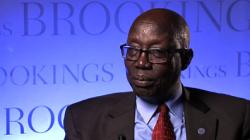We remember with appreciation, admiration, and special warmth Sadako Ogata, who was a Brookings distinguished fellow from 2012 until her death this year. She had a long and remarkable career as president of the Japan International Cooperation Agency from 2003-12 and as United Nations High Commissioner for Refugees (UNHCR) from 1991 to 2000. As high commissioner, Ogata left an extraordinary legacy of courageous and creative responses to the many humanitarian and political emergencies she confronted — whether the Kurds fleeing Iraq after the Gulf War, the displacement and ethnic cleansings of Balkans wars, the Kosovo conflict, or the Rwanda genocide followed by the crises in the Great Lakes region, not to mention the plight of millions of Afghan refugees.
Ogata was fearless. She visited conflict zones to speak directly to people on the ground, and she boldly expanded UNHCR’s protective coverage to encompass not just refugees but also internally displaced persons (IDPs) and other war-affected civilians. She made this decision despite UNHCR’s strictly legal mandate of not operating inside the border, citing “realistic humanitarian grounds.” “We chose to act,” she wrote, to not compound the suffering, and pointed out that “today’s state borders [in a number of conflicts] would become tomorrow’s international borders, and today’s internally displaced persons would become tomorrow’s refugees.” “We cannot permit the principle of national sovereignty to shield governments from their responsibilities toward their own citizens,” she declared.
As high commissioner, Ogata offered strong support to Deng as representative of the U.N. Secretary-General on Internally Displaced Persons and to the Brookings Project on Internal Displacement, which Cohen and Deng co-founded to support this mandate. Ogata embraced the framing of sovereignty as a form of responsibility in addressing the plight of IDPs, gave UNHCR’s backing to the Guiding Principles on Internal Displacement (recommending inclusion in the principles of a right not to be arbitrarily displaced), and publicly endorsed our 1998 Brookings study, Masses in Flight: The Global Crisis of Internal Displacement. As Deng recently wrote, Ogata’s “work for refugees was a source of inspiration for our own work for the internally displaced, especially on prevention and linking protection with assistance and the search for durable solutions. And of course, she was one of the first to recognize and uphold the significance of conceptualizing sovereignty as responsibility.”
Ogata’s special relationship with the Brookings Institution extended most strongly to presidents Michael Armacost and Strobe Talbott, both of whom she knew from earlier times. It was at Brookings in 1999 that Ogata and World Bank President Jim Wolfensohn launched a new initiative that Ogata called “The Brookings Process” to bridge “the relief-to-development gap” that affected recovery in post-conflict situations by perpetuating displacement. It was also Brookings that Ogata chose as the setting in 2003 to present the report “Human Security Now: Protecting and Empowering People,” published by the internationally renowned Commission on Human Security, which she co-chaired with Amartya Sen. In 2005, Brookings held a special meeting for Ogata to present her reflections on her memoir, The Turbulent Decade. In 2012, the institution proudly made Ogata a distinguished fellow, where she focused on issues of poverty and development.
A phenomenon and giant in the humanitarian, human rights, and refugee fields — and in revitalizing development policy for Japan — Ogata touched many around the world who will hold her in their fondest memories and with greatest appreciation.
The Brookings Institution is committed to quality, independence, and impact.
We are supported by a diverse array of funders. In line with our values and policies, each Brookings publication represents the sole views of its author(s).






Commentary
A tribute to Sadako Ogata
December 13, 2019